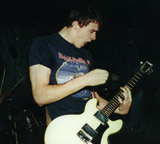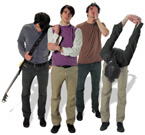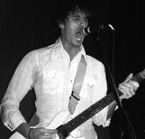by Lesley Barger
 Stephen Pedersen is accomplished in that kind of way that almost makes you want to hate him. Not only is he a practicing attorney, he is one of the founding members of Saddle Creek mainstay Cursive, guitarist and vocalist for Chapel Hill's now defunct The White Octave, and is currently the singer, songwriter, guitar player, bassist, composer, and all around idea-man for his new project Criteria, who recently released their debut album, En Garde, on Initial Records. The problem is that the man is so friggin' friendly that it's impossible to be anything but excited for all of his success. Example: the first 15 minutes of this interview was spent with Stephen asking me questions about my life. After finally getting the humble Renaissance man to begin talking about himself, Stephen discussed his multiple careers, his city, his bathroom and most of all, his insatiable lust for music.
Stephen Pedersen is accomplished in that kind of way that almost makes you want to hate him. Not only is he a practicing attorney, he is one of the founding members of Saddle Creek mainstay Cursive, guitarist and vocalist for Chapel Hill's now defunct The White Octave, and is currently the singer, songwriter, guitar player, bassist, composer, and all around idea-man for his new project Criteria, who recently released their debut album, En Garde, on Initial Records. The problem is that the man is so friggin' friendly that it's impossible to be anything but excited for all of his success. Example: the first 15 minutes of this interview was spent with Stephen asking me questions about my life. After finally getting the humble Renaissance man to begin talking about himself, Stephen discussed his multiple careers, his city, his bathroom and most of all, his insatiable lust for music.
JT: I guess I should start at the beginning of all this: why did you leave a band like Cursive for law school?
Stephen: I think the simplest answer is that I told myself that I would always be able to play music. And that's kind of the main thing for me, if I can play music I'm happy. Being in that band was ideal, especially after being in other bands, you realize how amazing that band is. They were totally down with it too; they were really supportive. And at the time, Tim Kasher was going to move, actually did move to Portland and was like, "If you are going to do this, I am going to do this." So it seemed to make sense.
JT: Did you ever regret it later when Cursive became so successful?
Stephen: No. Well, regret is a pretty strong word. There were moments, definitely, where I was maybe envious. But I never stopped playing music. I was in a band the whole time they were blowing up, so I had my own scene going. So I wasn't like, "Wow, I wish I could be playing music in a band," which is really the thing that I would miss.
JT: What made you come back? You're not currently practicing law are you?
Stephen: Yeah, I'm an attorney.
JT: Oh, scratch that then. But you came right back to Omaha?
Stephen: Well, after I graduated I spent about 10 months touring with my old band, The White Octave. After that time I basically ran out of money; my loans were coming due. So I needed to find a job where I could afford to pay back my loans. My family is here, my friends are here; there were so many reasons for me to come back here. I knew I could come back and get a good job and buy a house and put a recording studio in it and make a record.
JT: Yeah, that's one of the good things about Omaha is that it's cheap. I'm intrigued, what do you think it is about Omaha that keeps creating such incredible songwriters and musicians and artists?
Stephen: It's the people. A lot of it is timing. The town has been making great music a lot longer than the Saddle Creek bands have been making great music. There was a foundation and a standard of songwriting in the music scene that was expected or respected or revered, and you wanted to be that good, and you wanted to do the music justice I guess. So, you have that, and then you havečand I can only speak for the Saddle Creek peopleča work ethic among everybody that is relentless. I mean everybody works extremely hard. Everyone is very bright. And we've been making music together for over a decade. It's a whole bunch of things, but it's primarily the people.
JT: Is it intimidating making music in a town like that?

Stephen: I don't know. It's not for me, but I may be somewhat insulated from some of that because I've been doing it for so long. I don't worry too much about it. I like what I'm doing, and that is what this record is about. The En Garde record is the first time I've ever made an album on my own, so I did exactly what I wanted to do for everything: the vocals, the bass, the drums, the guitars. I got to do everything. I played everything myself but the drums. I wrote most of the beats, but I'm not a very good drummer. My friend Mike Sweeny is a phenomenal drummer. He made all the beats even better. But yeah, otherwise, it's pretty much all me.
JT: What is the songwriting process for you; are you one of those people that sit down for a week at a time, not eating, scribbling things out? Or is it a slow, step-by-step process?
Stephen: Totally depends on the song. Sometimes it's very drawn out and calculated and edited and deliberate. And sometimes it happens in a couple of minutes. I don't really have one method that I stick to. Probably the most interesting tool, at least for this record, is this program called ProTools. I basically made the record in my house. I used my computer and this ProTools system to make the record. But it's also a songwriting tool, because I could write the song, put down the guitar line, put down the beat and listen to it. I could take a step back from it and edit it from afar, as opposed to being constantly caught up in it, if you are writing the song on the guitar and the only way you see the composition is while you are performing it. To not have to perform it and just listen, for me, was very helpful.
JT: Cool. So you built a studio in your house?
Stephen: Well... "built" might be too extravagant a word, but yes. I have a lot of equipment, but I don't know if there is really any space that would be clearly seen as a studio.
JT: Living room, bedroom, bathroom...
Stephen: Exactly! I tried to use the whole house, you know.
JT: The bathroom gets a good echo. I wouldn't underestimate it.
Stephen: It does, it does. Unfortunately, it didn't work out in the bathroom...
JT: Well, that happens sometimes.
Stephen: [not getting my obvious joke]... and uh, it was just too much of a wash.
JT: [not getting his obvious joke] Alright, we'll move beyond the bathroom. The album came out really well. Is it insulting or a compliment to say that I can hear a bit of Tim Kasher in it?
Stephen: No, it's not an insult. Maybe if it happened quite a bit I would be more reactionary about it, but it's not a comparison that I get so much where I feel like I need to worry about what I'm doing. Obviously I don't want to rip off the man, but he is the biggest influence on me as a songwriter, a guitar player and as a singer. Just being immersed in his style for so many years, it makes sense. The similarities that I have with Tim should be effortless because it's just a part of me.
JT: Just listening to it, it has this very inspirational, anthemic quality to it. Why that kind of music for you right now?
Stephen: Uh... whoa... that's a good question; I'm just trying to figure out how to answer it with out sounding like an idiot. I'm a very positive person. I'm just kind of a blind optimist. I try to balance out the anger in the music with this positive tone. I can be singing about some messed up shit, but there's still a sense of hope. I'm a hopeful guy.
JT: That's good coming from a town like Omaha. There's so much... .

Stephen: [laughing] Despair? It's definitely not for everybody. It isn't the greatest city on earth, but I'm just here for the people. I think that is whey most people are here. It is really easy to create intimate connections with people, but I'm not talking sexually...
JT: But you can.
Stephen: Yeah, it's probably pretty easy for some people. I'm not very good at that. But the psychological nature of this city is just condusive to creating relationships. I don't know how. It is very easy to live here. So very little of your attention is drawn to the chaos of your environment because it simply isn't very chaotic. So you just spend more time engaging people. I don't knowčI'm much more comfortable talking about myself than the city. I know a lot more about myself than I do about the city, I hope. Maybe not. Who knows?
JT: Alright, we'll move on then. What are your goals with this album? Are you going to still try to be an attorney at the same time that you are doing this?
Stephen: That is the dilemma that I live with every day. I would love to go and tour for 6 months out of the next 12 to promote this record and get the word out and have the experience of traveling again. But mainly because I want people to know about the record, I guess, and I'm not going to be able to do that, which kind of sucks.
JT: Are you tied up in a firm right now?
Stephen: [laughing at the word firm, and I don't quite know why] I am tied up in a firm, yes. And, you know, if I wasn't a rock musician who put out records, I think I would be completely content with what I do during the day, but, you know, I have this other thing. And I guess I should have seen it coming, because I've always sort of found some sort of equilibrium between the two, because with college and law school I could leave. I could travel, and I wouldn't lose my job. So I had the free time to do music the way I want to do it. And now for the first time in my life I'm in a position where I don't have the kind of time to do music the way I want to do it. What it really comes down to is touring. I can still write songs and I can still release records and rock out with my friends, and for me, those are the core things. If I can't have those I'm bummed out, but if I've got those I'm a happy camper. So the touring would be the icing on the cake.
JT: Are you going to be able to tour at all, do you think?
Stephen: Yeah, I'm going on a West Coast tour with Cursive in October. So it should be good times. I'm just going to be on two weeks of it.
JT: So that's doable with work.
Stephen: With the firm [laughing, and I still don't get it], yes the firm will accept the two weeks vacation. They are very supportive of me, the firm, from the leadership to the paralegals, they all take a genuine interest in what I do and come to shows and ask about the music, so it's cool.
JT: Do you see this album as sort of the last thing you are going to be able to do before you delve into your career in law?
Stephen: What, before I lose all my hair and stop writing rock songs? Before I put out a bad acoustic album and call it quits?  Oh man, I hope not! No, I never know. After each record I go through maybe 3 or 4 months of not being satisfied with anything I write. It's not like it just has to be good, but it also has to be so much better than the songs on the record, and I just haven't found that song yet. So that is kind of frustrating.
Oh man, I hope not! No, I never know. After each record I go through maybe 3 or 4 months of not being satisfied with anything I write. It's not like it just has to be good, but it also has to be so much better than the songs on the record, and I just haven't found that song yet. So that is kind of frustrating.
JT: But overall, you are planning on keeping it up?
Stephen: Oh absolutely! I can't really see myself stopping. I think I have the same bug as Tim and Connor and Ted. It's hardwired to just be doing this. The main thing is just writing music, making music. All the rest of it is amazing and wonderful too, but it got started because everyone loves to make music. I still love making music.
En Garde is currently available from Initial Records. MP3s are available there and at Criteria's website.
 Stephen Pedersen is accomplished in that kind of way that almost makes you want to hate him. Not only is he a practicing attorney, he is one of the founding members of Saddle Creek mainstay Cursive, guitarist and vocalist for Chapel Hill's now defunct The White Octave, and is currently the singer, songwriter, guitar player, bassist, composer, and all around idea-man for his new project Criteria, who recently released their debut album, En Garde, on Initial Records. The problem is that the man is so friggin' friendly that it's impossible to be anything but excited for all of his success. Example: the first 15 minutes of this interview was spent with Stephen asking me questions about my life. After finally getting the humble Renaissance man to begin talking about himself, Stephen discussed his multiple careers, his city, his bathroom and most of all, his insatiable lust for music.
Stephen Pedersen is accomplished in that kind of way that almost makes you want to hate him. Not only is he a practicing attorney, he is one of the founding members of Saddle Creek mainstay Cursive, guitarist and vocalist for Chapel Hill's now defunct The White Octave, and is currently the singer, songwriter, guitar player, bassist, composer, and all around idea-man for his new project Criteria, who recently released their debut album, En Garde, on Initial Records. The problem is that the man is so friggin' friendly that it's impossible to be anything but excited for all of his success. Example: the first 15 minutes of this interview was spent with Stephen asking me questions about my life. After finally getting the humble Renaissance man to begin talking about himself, Stephen discussed his multiple careers, his city, his bathroom and most of all, his insatiable lust for music. 

 Oh man, I hope not! No, I never know. After each record I go through maybe 3 or 4 months of not being satisfied with anything I write. It's not like it just has to be good, but it also has to be so much better than the songs on the record, and I just haven't found that song yet. So that is kind of frustrating.
Oh man, I hope not! No, I never know. After each record I go through maybe 3 or 4 months of not being satisfied with anything I write. It's not like it just has to be good, but it also has to be so much better than the songs on the record, and I just haven't found that song yet. So that is kind of frustrating.